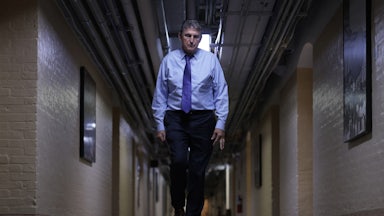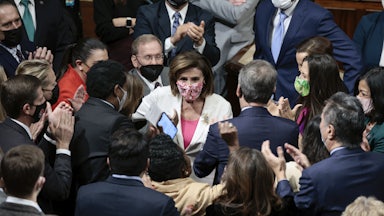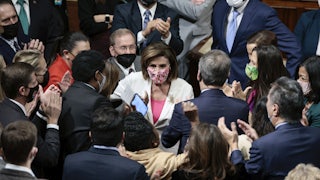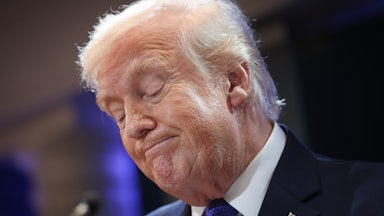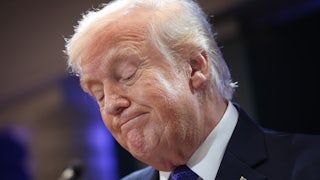Tucked away in the version of the Build Back Better Act passed by the House—Section 138502, to be precise—there is a small paragraph extending an excise tax that funds a trust providing benefits to certain coal miners with coal workers’ pneumoconiosis, commonly known as “black lung disease.” The current rate for the tax, the primary revenue source for the Black Lung Disability Trust Fund, is set to expire at the end of the year; the Build Back Better Act would extend it through the end of 2025.
The extension is but one of many unobtrusive measures sandwiched into a massive package addressing health care, childcare, education, climate change, and tax policy. But without congressional action before the end of the year, the excise tax rate will be cut roughly by half, diminishing a key source of revenue for a fund that is already riddled with debt.
But movement on the Build Back Better Act is stalled in large part due to objections from a moderate Democratic senator from West Virginia, one of the states whose citizens are most affected by black lung disease. Senator Joe Manchin has balked at the long-term costs of the bill and worried about the implementation of some social programs, such as the child tax credit. Barring some Christmas miracle, it appears that the Senate will recess for the rest of the year without voting on either the Build Back Better Act, or a bill Manchin introduced earlier this year that would extend the excise tax by 10 years. The excise tax rate is almost certain to be reduced by 55 percent as a consequence.
Black lung disease affects one-fifth of veteran miners in Central Appalachia, according to a 2018 report by the National Institute for Occupational Safety and Health, and disease prevalence has risen dramatically since 2000. The Black Lung Disability Trust Fund provides benefits to coal miners who are disabled by black lung disease—or their surviving dependents—when those miners’ employers have gone bankrupt or when no mining company can be identified as responsible for their disease.
In 2019, black lung benefits were distributed to roughly 25,700 people. In 2020, over $162 million in benefits was distributed nationally from the fund, and over $40 million of that to families in West Virginia, according to the Department of Labor. While the number of beneficiaries has steadily decreased since 1981, the number of people identified with the disease has risen. The increased number of cases of the most severe form of black lung disease, progressive massive fibrosis, could result in more beneficiaries relying on the trust fund in the near future, putting more stress on the program.
The fund is primarily supported by the black lung excise tax, but it has borrowed heavily from the Treasury Department since it was established in 1979. Recent coal company bankruptcies have also put a strain on the program, as benefit responsibilities were transferred from the companies to the trust fund; between 2014 and 2016, $865 million in benefit liabilities were transferred to the trust fund. The trust fund is currently several billion dollars in debt.
So it’s not as if keeping the excise tax funding the program is a cure-all, particularly since there has been an overall decrease in coal production in recent years. Reducing it will, nevertheless, compound the problem—particularly amid a deadly pandemic that is especially dangerous for people with preexisting respiratory problems.
From 1986 to 2018, the coal tax rate was $1.10 per ton of underground-mined coal and $0.55 per ton of surface-mined coal. In 2019, that rate was decreased to $0.50 and $0.25 respectively. End-of-year spending packages passed in 2019 and 2020 returned the tax rates to pre-2019 levels, but Congress has not taken action on the trust fund this year. In the succinct words of the Government Accountability Office, which has outlined issues with the trust fund: “With less revenue from the coal tax, the trust fund will likely need to borrow more from Treasury’s general fund, and taxpayers will ultimately be responsible for repaying this accumulating debt.”
Manchin has repeatedly introduced bills to extend the excise tax by 10 years, alongside other Democratic senators who represent states with large populations of former miners with black lung disease. Shelley Moore Capito, the Republican senator from West Virginia, has not co-sponsored Manchin’s latest bill to extend funding by 10 years, although her office said she supports extending but not raising the excise tax, according to The Logan Banner.
A 10-year extension of the excise tax would offer greater stability than the four-year extension included in the Build Back Better Act. But the House has already voted on the latter bill, and the 10-year extension does not currently have a companion bill in the lower chamber. Moreover, representatives have already left Washington for the year, meaning that even if the Senate passed the Black Lung Benefits Disability Trust Fund Act of 2021 today, the House would not be able to vote on it before the tax was reduced. If the Senate had passed the Build Back Better Act in a timely fashion, the four-year extension would be in effect as soon as President Joe Biden signed it.
Senator Bob Casey, one of the co-sponsors of the 10-year extension bill, told The New Republic that the Senate “may have to” address an extension of the tax separately from the Build Back Better Act. “Around here, though, it’s exceedingly difficult to have an individual bill voted on without it being attached to some other moving vehicle,” Casey said. “But it’s important that we consider any option to get it done.”
Senator Sherrod Brown, another co-sponsor of the bill, told The New Republic that the looming reduction of the excise tax was “fixable.” “But we’ve got to move quickly. I would hope by the end of the year, if not soon after we come back,” Brown said. When asked if he would press forward with a 10-year extension, Brown replied, “I think we get what we get.”
“I always want to do it longer and make it predictable for people that are hurting,” Brown said.

